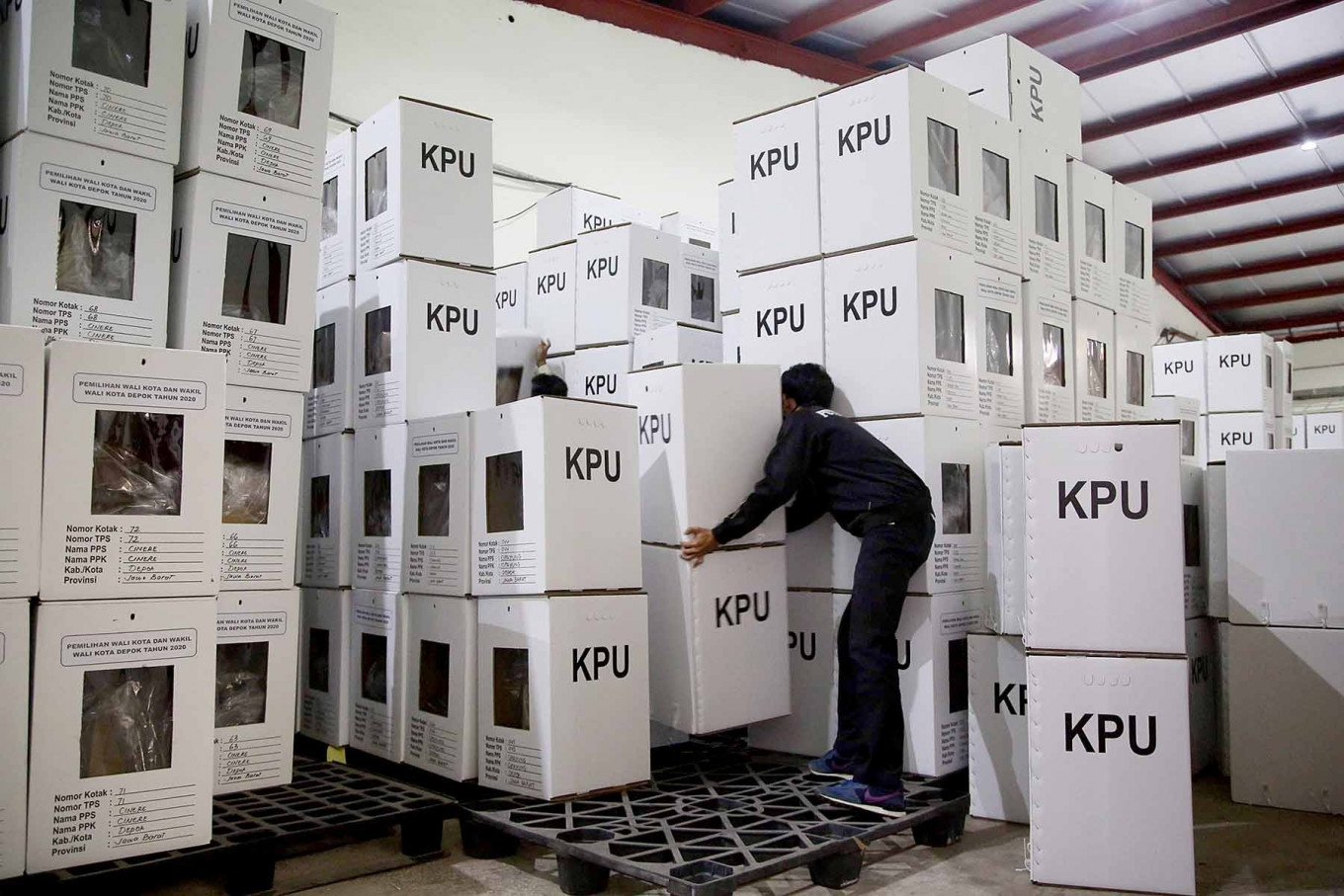Depok mayoral election a 'test' for PKS’ political dominance
Depok's current leadership have split up to take on one another as candidates in next week's mayoral election.
Change Size

T
he 2020 mayoral race in Depok, West Java next week will mostly be a test to see whether the Islam-based Prosperous Justice Party (PKS) can maintain its years of political dominance in the city, experts have said.
Two candidate pairs, each with an equal chance of winning the contest, will be competing this year in Jakarta’s southerly neighbor, which is just one of 270 regions to be holding simultaneous elections on Dec. 9.
The first election candidate is incumbent mayor M. Idris, who has the backing of the PKS, the dominant political force in the city. Idris also enjoys support from the Democratic Party and the United Development Party (PPP).
Depok has been known as a PKS stronghold for the past 15 years, with its endorsed candidates going on to win the mayoral elections in 2005, 2010 and 2015. The party is also a dominant force in the Depok Regional Council (DPRD), having taken 12 of the total 50 seats, or nearly a quarter of the city’s councilors.
However, Idris will have to go up against his current deputy, Pradi Supriatna, who came into the contest with an altogether different kind of political support.
Pradi’s candidacy has been endorsed by six parties, comprising the Indonesian Democratic Party of Struggle (PDI-P), Gerindra, Golkar, the National Awakening Party (PKB), the National Mandate Party (PAN) and the Indonesian Solidarity Party (PSI).
These six parties currently have 33 Depok council seats between them, more than double the amount of councilors backing Idris’ ticket. Experts have said that this makes Pradi a worthy opponent in this year’s election.
“The upcoming Depok election will be interesting, as we will see Idris, who is backed by the city’s highly influential political force, square off against Pradi, who is supported by many other political parties,” said Indonesia Political Review executive director Ujang Komarudin on Thursday.
“Both candidates have the same level of political support to win the mayoral election, which may pose a threat to the PKS' years of political dominance in the city.”
A bastion of conservative Islam on the outskirts of Jakarta, Depok was rated among the top five least tolerant municipalities in the entire country, according to a 2015 study by the Setara Institute for Democracy and Peace.
Its administration had considered a regional bylaw to ban LGBT groups and it also prepared a draft religious city bylaw tabled by the PKS, which looked to appease residents with conservative policies.
After the conviction of gay serial rapist Reynhard Sinaga in the United Kingdom late last year, incumbent mayor and PKS politician Idris announced plans to raid the local LGBT community in Depok, attracting condemnation.
The PKS previously did not consider Idris for the upcoming election, choosing instead to nominate other party cadres as the mayoral candidate. Only in July did PKS choose to back Idris, with the party’s Depok board election campaign lead Muttaqin calling it “realistic”, tempo.co reported.
However, overthrowing the PKS in Depok would not be an easy feat even for Pradi, Ujang warned.
When each candidate can rely on their unique political advantage, he said, the winner will likely be determined by the way the masses can swing the needle in one direction.
If this is the case, Idris could have the edge over Pradi.
Depok voters, Ujang said, might also prefer Idris because he is the incumbent mayor, so the public is more readily able to assess his policies and contributions to the city’s economic development in the last five years.
Conversely, voters might feel hesitant to vote for Pradi for the simple reason that he is the deputy mayor, a position that is sometimes perceived by the public as merely “complementary” to the mayor.
Pradi will ultimately be tested for his ability to convert the endorsements of the six political parties into actual votes, said Adi Prayitno, a political expert from Jakarta’s State Islamic University (UIN).
“Translating support from parties into votes will definitely be Pradi’s task,” Adi told the Post on Thursday.
In terms of potential, however, a majority of Depok voters have so far shown to be supportive of Pradi as a means to loosen the PKS’ political grip on the city.
A survey conducted by the Democracy and Electoral Empowerment Partnership (DEEP) pollster from Sept. 15 through Sept. 30 showed that 42.2 percent of eligible voters in Depok would vote for Pradi, Warta Kota reports.
Only 36.4 percent of people will vote for Idris, while 14.4 percent were still undecided, according to a survey of 582 respondents from the city.
Despite the stiff challenge from Pradi, the head of the PKS’ Depok executive board, Hafid Nasir, said last month that the party was confident that Idris could secure a minimum of 70 percent of all eligible votes.
Meanwhile, the secretary of Gerindra’s Depok chapter executive board, Hamzah, claims that Pradi could get a minimum of 60 percent of the vote, kompas.com reports.
Both mayoral candidates and their respective deputies are expected to face off in the last televised debate for the Depok mayoral election on Friday, with Idris staging a comeback after testing positive for COVID-19 last week.









